Effective Home Remedies for Anti-Ageing
By Dr Anuja Bodhare +2 more

Get,

to manage your symptom
Get your,


4 Cr+ families
benefitted

OTP sent to 9988776655



You’ve successfully subscribed to receive
doctor-approved tips on
Whatsapp

Get ready to feel your best.

Hi There,
Download the PharmEasy App now!!


Register to Avail the Offer
Send OTPBy continuing, you agree with our Privacy Policy and Terms and Conditions

Hi There,
Sign up on PharmEasy now!!
Trusted by 4 crore+ families

OTP sent to 9988776655



You have unlocked 25% off on medicines




Code: NU25
By Dr Anuja Bodhare +2 more
Table of Contents
Skin ageing is a complex natural process that occurs because of inborn or natural factors (hormones, cellular metabolism, genetics and metabolic processes) or external factors (chemicals, pollution, long-term exposure to light, toxins and ionising radiation)1. The skin ageing process that is controlled by genetics is known as intrinsic ageing, while environmentally induced aging is known as extrinsic aging or photo-aging1.
Fine wrinkles and a thinner epidermis (the outermost layer of skin in the body) are common signs of intrinsic ageing as people become older2. Anti-aging is a therapeutic process that requires several steps as it is a combination of several methods for the restoration of different layers of skin1. There is a rise in demand for healthier options for anti-ageing skincare approaches. This includes a good skincare routine and exploring the relevance and potential of diverse natural resources2. Read along to find out some home remedies that can come in handy.
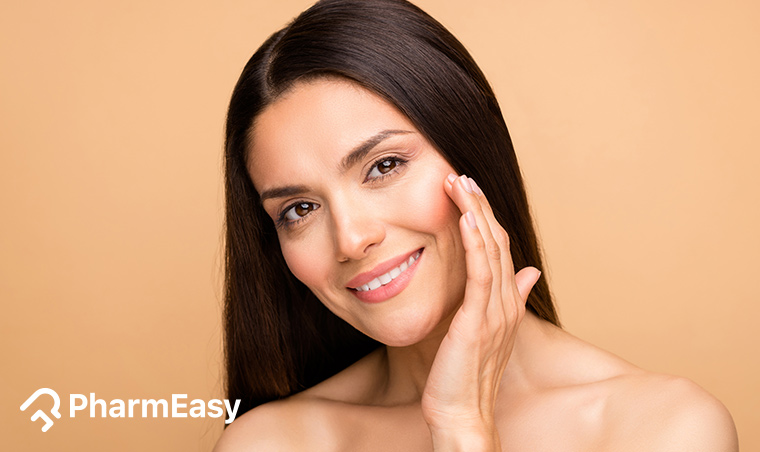
Did you know?
Biologically, aging occurs due to the build-up of a range of molecular and cellular injuries over time. As a result, there is a gradual reduction in the physical and mental capacities of individuals as well as an increased risk of disease and eventually death. These changes are not constant and are only related to a person’s age in years3. The surroundings in which people grow up along with their traits influence how they age in the long run. There are two types of factors that cause ageing; these are intrinsic and extrinsic factors. There are different pathways and mechanisms for intrinsic and extrinsic ageing, but there is synergy in the effect of both the types for every individual2.
The changes that can be noticed in your skin due to ageing are:
Several natural and sustainable remedies are available for anti-aging. Several measures that involve simple changes in lifestyle can be beneficial. These include avoiding excessive sun exposure, maintaining a healthy diet and following appropriate skin care practices1,2. Different home remedies for anti-aging include:
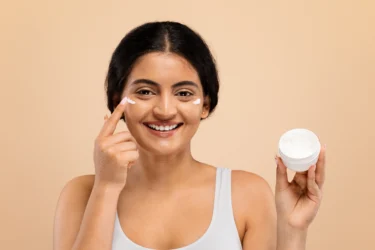
The three types of moisturising agents are emollients, occlusives and humectants2.
Anti-ageing remedies like moisturizers can plump up fine lines in a few days, but most products take at least six weeks to three months at times to work. Be patient and give the product time to work.
Dr. Ashish Bajaj, M.B.B.S., M.D. in Clinical Pharmacology and Toxicology
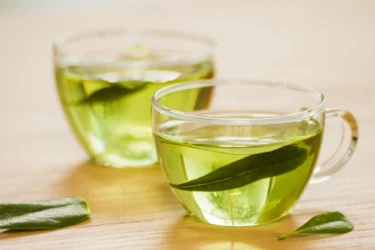
Anti-oxidants nourish the skin and protect it from free radical damage by substituting for the skin components that free radicals normally destroy. Anti-oxidants can be grouped into water-soluble anti-oxidants and oil-soluble anti-oxidants. Water-soluble anti-oxidants include vitamin C, coffeeberry, green tea and glutathione. Oil-soluble anti-oxidants include vitamin E and vitamin A2.
Red wine has anti-ageing properties and is present in different anti-oxidant skincare formulations. Apart from this compound, certain compounds present in peanuts and alfalfa sprouts help to manage and prevent wrinkles due to ageing2. There are two ways to take anti-oxidants for skin, i.e., dietary inclusion and topical application.
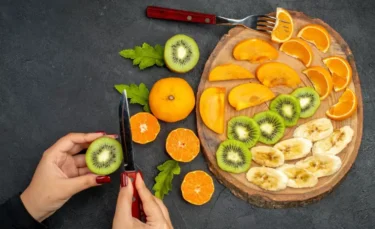
Vitamins play an essential role in skincare. Vitamins that are commonly used in skincare include vitamin A, vitamin E and vitamin C.
There are two ways to use vitamins for skin-oral intake and topical application.
Vitamins C, B3, and E are the most important antioxidants because of their ability to penetrate the skin through their small molecular weight.52 The water-soluble, heat-labile local L-ascorbic acid (vitamin C) in concentrations between 5 and 15% was proven to have a skin anti-aging effect . So whenever choosing fruits or creams look for these ingredients.
Dr. M.G. Kartheeka, MBBS, MD(Pediatrics)
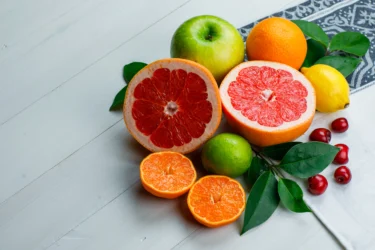
These acids are also referred to as fruit acids. They are known due to their anti-ageing effects, such as reducing fine wrinkles, spots, discoloured skin and dryness. Hydroxy acids are grouped into alpha-hydroxy acids and beta-hydroxy acids2.
The alpha-hydroxy acid group includes citric acid (obtained from citrus fruits), lactic acid (obtained from fermented fruits), glycolic acid (obtained from sugarcane), and tartaric acid (obtained from grapes) and malic acid (from fruits)2.
Alpha-hydroxy acids are helpful in managing dry and ageing skin. Beta-hydroxy acids can be used on oily and acne-prone skin2. Topical applications of alpha-hydroxy acids can be used for skin care.
Also Read: Simple Home Remedies For Acne Scars
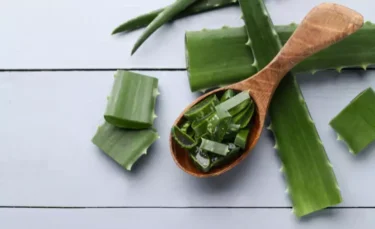
Sunburns, dark patches, discolourations, sagging or leathering, and wrinkles are all caused by ultraviolet (UV) B radiation, which is a shorter wave UV ray. Several natural remedies are known to protect from sun exposure. These include aloe vera, coconut oil, ginger, green tea, shea butter, vitamin E, caffeic acid and tamanu oil2. Topical applications of these herbs can be made for skin care in the following manner:
Some sunscreen can be taken and applied to your face. You can use a moisturiser after applying sunscreen. Sunscreen can be used every day before you are exposed to the sun.

These agents work by decreasing the quantity of melanin (the pigment responsible for skin pigmentation). Skin lightening agents are helpful in skin problems such as dark age spots, dullness and hyper-pigmentation, which are common conditions associated with ageing. Several natural agents are used as skin lightening agents, such as white mulberry extract, bearberry extract, vitamin B3, liquorice extract, citrus extract and Indian gooseberry2. These agents can be mixed with ingredients such as yoghurt and honey and then applied to the face.

These are useful ingredients in the skincare regimen for strengthening skin barrier function and boosting overall skin health. Natural oils have fatty acids that play an important role in maintaining the skin barrier and preventing ageing2.
The two groups of essential fatty acids include omega-3s and omega-6s. Omega-3s are present in flaxseed oil, chia oil and walnut oil. Omega-6s are present in safflower oil, sunflower oil, grapeseed oil and evening primrose oil2. A few drops of these oils can be taken on your palm, rubbed to make it warm and then massaged on your face.
Also Read: Natural Home Remedies for Itchy Skin
You can visit the doctor in the following cases:
Also Read: How to Get Rid of Skin Tags: A Step-by-Step Guide Based on Science
A variety of lifestyle measures such as avoiding excessive sun exposure, maintaining a healthy diet and following appropriate anti-ageing skincare practices can help in graceful ageing. With age, a lot of changes can be observed in the skin, such as less elasticity, thin and more fragile skin. Skin becomes more susceptible to bruising. Age spots and skin tags become very common as you age. With age, you can also develop dry skin. Natural ingredients are considered safe and effective for managing the symptoms of ageing. Home remedies such as cocoa butter, avocado oil, almond oil, castor oil, honey, jojoba oil, beeswax, green tea, shea butter, oats, turmeric and sunflower oil can be used on the face for anti-ageing benefits. It is essential to consult your physician if your condition starts affecting your mental health or if there are visible signs of premature ageing.
Also Read: Home Remedies For Dark Underarms
Avoiding smoking, overexposure to the sun, stress, following proper nutrition and physical activity and maintaining general health are some ways to delay signs of ageing1.
Age spots, also called liver spots, are flat, brown spots associated with ageing. These occur mostly due to long periods of exposure to the sun. They are bigger than freckles in appearance and commonly develop on the face, arms, hands, feet and back. Using sunscreen can help to prevent age spots2,4.
An anti-ageing skincare routine generally consists of vitamins along with other components. These can enhance skin texture and elasticity. Vitamins are vital for skin care as they reduce the appearance of wrinkles. Some of the commonly used vitamins in skincare include vitamins A, E and C. Vitamins can either be consumed or applied topically for benefits2.
With age, the skin becomes thinner and losses elasticity and even becomes more fragile as the fatty tissue content below the skin reduces. There is also reduced production of natural oils that makes the skin drier. Some of the visible signs of skin ageing are age spots, wrinkles and small growths called skin tags4.
Disclaimer: The information provided here is for educational/awareness purposes only and is not intended to be a substitute for medical treatment by a healthcare professional and should not be relied upon to diagnose or treat any medical condition. The reader should consult a registered medical practitioner to determine the appropriateness of the information and before consuming any medication. PharmEasy does not provide any guarantee or warranty (express or implied) regarding the accuracy, adequacy, completeness, legality, reliability or usefulness of the information; and disclaims any liability arising thereof.
Links and product recommendations in the information provided here are advertisements of third-party products available on the website. PharmEasy does not make any representation on the accuracy or suitability of such products/services. Advertisements do not influence the editorial decisions or content. The information in this blog is subject to change without notice. The authors and administrators reserve the right to modify, add, or remove content without notification. It is your responsibility to review this disclaimer regularly for any changes.
Comments

Leave your comment...
You may also like
Comments